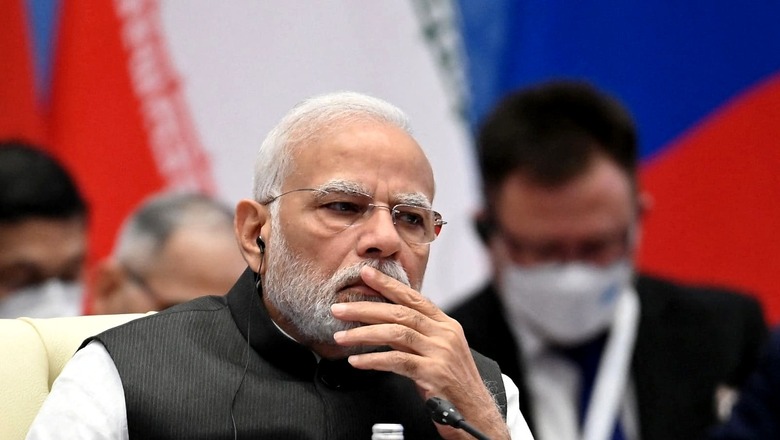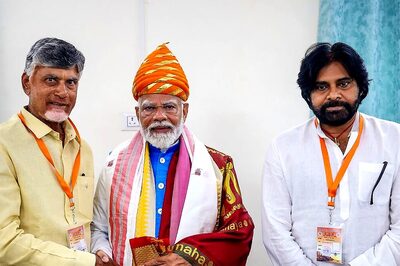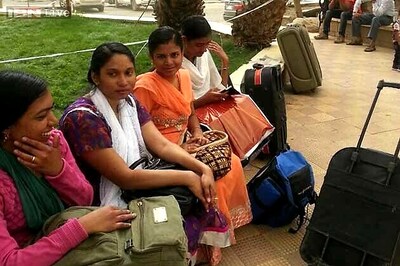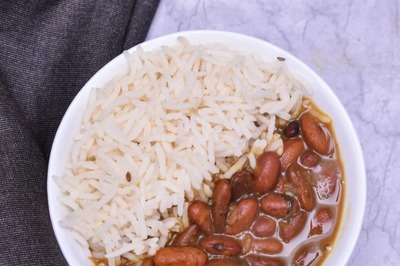
views
The glory of Samarkand, once the stuff of legend, was once again on full display as the leaders of the Shanghai Cooperation Organization (SCO) descended on to the tarmac. All eyes were on the bilateral meetings on the sidelines, with speculation on the possible meeting between Prime Minister Narendra Modi and Chinese President Xi Jinping. Unsurprisingly, that didn’t happen, but plenty else did. And with one new member, another in the offing, and another five as dialogue partners, the SCO is a growing child, and is gathering pace. An alliance it is not, and its documents often lack anything substantial, but for India it is important to be there for multiple reasons.
SCO as a growing child
As the Prime Minister said, the SCO with new member Iran, comprising nine member states (China, Russia, Kazakhstan, Pakistan, Uzbekistan, Tajikistan and Kyrgyzstan), does include more than a third of world population and contribute some 30 percent of Gross Domestic Product. Since India and Pakistan joined in 2017, both get to sit at the high table, while Afghanistan has observer status, and Nepal and Sri Lanka are dialogue partners. Belarus is to transit to full membership, but Mongolia was in the first category, while Armenia, Azerbaijan, Cambodia, and Turkey in the second. To that can be added Myanmar, Maldives, Bahrain, Kuwait and United Arab Emirates, who are all prospective dialogue partners.
Looking at the list, it seems that SCO members do rather fight among themselves. That given another outbreak of war in Armenia, and a still simmering border tensions between Uzbekistan and Kyrgyzstan. That latter is close to being settled once and for all, which is more than one can say about the India-China border disputes, despite the showcasing of disengagement at Gogra. So the bottom line: Despite all the big talk of military exercises and the like, the SCO is not a security organisation which requires trust and a common goal among members. Which is why India sends only a token contingent, and tolerates Pakistani presence. Given the suspicious gaze from Washington, and the realities of a menacing China, that’s about all we’re comfortable with.
Connectivity to where?
Given the massive size of the SCO, there is considerable potential in trade, and connectivity across the region. Don’t forget Samarkand was once the centre of a caravan trade that spanned the continent. Today’s ‘caravans’ would be trucks and pipelines. SCO members have among them major gas and oil suppliers in the region (Russia, Kazakhstan) and also the largest consumers (China, India). Again, among them are also the largest wheat producers, which includes India. The Samarkand Declaration therefore rightfully centralises connectivity which is a priority for India, as well as energy and food security.
So far ‘connectivity’ has only benefited China. The organisation has so far been unabashedly Chinese dominated with its Secretariat in Beijing. All existing SCO members have signed on to the Belt and Road Initiative; nearly have hefty Chinese investment and its ungainly twin of unsustainable debt; and some like Kazakhstan and Russia are main partners for connectivity to Europe — which essentially means Chinese freight trains plying to and fro. Which is why the Prime Minister stressed on the need for all countries to cooperate in allowing transit. With Iran now a full member, both have recently given another push for transit trade through Chabahar, a project that has been lagging in part due to sanctions on Iran, and in part due to Teheran’s lassitude.
Then there is the obvious alternative. Pakistan’s Army chief has been talking of a shift to ‘geo-economics’ for the last two years, stressing its geographic location for precise transit. As Pakistan quite literally sinks into the mire of economic decay, there is hope that some progress will take place, particularly since Islamabad did allow transit of wheat for Afghanistan; and in a less known development, allowed commercial cargo through to Uzbekistan. That was done after Pakistan inked a bilateral transit trade agreement with Tashkent. Step one is therefore already done. The trouble is that this came via Mumbai and Karachi. Pakistan has to be persuaded to open land corridors which are the cheapest and shortest route. For Central Asia as well as Pakistan, the Indian market is the obvious alternative to a complete domination by China, in multiple ways; especially since leading recipients of Chinese investment like Kazakhstan are having second thoughts.
The political balancing in SCO
Apart from divided militaries, there are also strong political divisions within the SCO. As President Xi Jinping was awarded state honour in Kazakhstan and Uzbekistan on his visit, Moscow would be alarmed, notwithstanding all the public camaraderie. Moscow has rather helplessly been watching Beijing’s march across the region. Russia still retains the military lead through the CSTO (Collective Security Treaty Organisation), which maintains a semblance of control. In a sense, this is China outsourcing this tricky operation, while it collects the big bucks.
But all is not well. President Xi’s concerns on Ukraine, though likely to be broadly similar to that of Delhi in terms of a huge economic impact, also has a more direct problem. The 3680 Chinese freight trains that ran across Russia to Europe are now stalled due to the war. As it faces drought and Covid lockdowns, Beijing will want this war ended — and fast.
India seems to have sent the same message, according to a Kremlin read out. But to get leverage within the SCO, including its policies in Afghanistan, India can’t do without Russian support. As Delhi moves away from Russian weaponry, it needs more ballast. As an expert analyst points out, there is opportunity in exploitation of Russian hydrocarbon resources, as Western majors pull out of its energy sectors. That includes Shell relinquishing its equity partnership with Gazprom and its stake in Sakhalin-II, and British Petroleum pulling out of a partnership with Rosneft. It’s possible, especially if connectivity triumphs. Within a big organisation, think big.
…And the balance outside
Meanwhile, reports from the US observe an incredible expansiveness in China’s nuclear weapons capability in a definite shift away from ‘minimum deterrence’. That’s a matter of serious concern, even assuming that there was no border conflict at all. As Washington moves towards greater pressure on China with the Taiwan Policy Act 2022 under active consideration, tensions between the US and China are set to climb. This occurs even as Delhi commits itself not just to the Quad, but also to new partnerships such as an France-Australia-India trilateral, and most recently in an interaction with France which promises to energise this grouping.
Other ‘mini-laterals’ thrive, with Japan and the US, and another with Italy and Japan. All of this is only likely to make Beijing uneasy, whereupon it has the choice of either increasing cooperation with India in SCO — for instance, in pressuring Pakistan to open up transit trade — or upping the military ante. The most vital requirement is a complete border settlement that will act as a massive confidence building measure. But Beijing doesn’t seem to see this simple logic.
As India takes on the SCO presidency, it will be confronted with the reality of urgent common problems among members, that includes a severe climate crisis. All of this, including energy and food security, require cooperation on the ground, and not just nice sounding “declarations’ if the organisation is to grow to its potential, which is considerable. On a more local note, it is heartening that the SCO’s founding documents — which both India and Pakistan signed — also has a focus on ending terrorism. Though that did not prevent China from blocking terrorist designations of Pakistani nationals, there is a genuine fear of radicalisation among these less than democratic leaders.
While the RATS (Regional Anti-Terrorism Structure) is hardly in the James Bond category, it has been useful in that it now proposed to create a unified register of terrorist and extremist organisations whose activities will be prohibited on the territories of the SCO member countries. That’s something too. For Delhi, the year ahead will be full of opportunities, some of which may actually be an enabling factor in China-India relations. But for that to happen, it is Beijing that has to decide what it wants the SCO to be. A gaggle of warring and dissonant voices, or one which actually delivers prosperity. Even in terms of normal human conduct, never mind huge unwieldy organisations, the choice should be obvious.
The author is a Distinguished Fellow at the Institute of Peace and Conflict Studies, New Delhi. She tweets @kartha_tara. The views expressed in this article are those of the author and do not represent the stand of this publication.
Read all the Latest Opinion News and Breaking News here




















Comments
0 comment